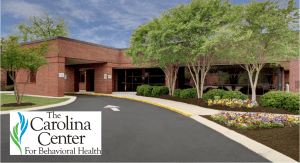Mental Health and COVID-19
By Megan Rogers, Director of Business Development for The Carolina Center
We are almost two years into the COVID-19 pandemic and there is no doubt that it has had a major effect on almost all aspects of our lives. Many of us are facing extreme challenges emotionally, socially and financially that can lead to overwhelming stress. Persistent isolation can also increase stress and anxiety, especially in those who are already vulnerable.
A crisis is growing in mental health as the widespread impacts of the COVID-19 pandemic and the economic hardship it has brought affects many across the nation. A June 2020 survey from the Centers for Disease Control and Prevention of 5412 US adults found that 40.9% of respondents reported “at least one adverse mental or behavioral health condition,” including depression, anxiety, posttraumatic stress, and substance abuse, with rates that were 3 to 4 times the rates 1 year earlier.1 Remarkably, 10.7% of respondents reported seriously considering suicide in the last 30 days.1
People who have had the virus may still be feeling the physical effects and may be depressed with survivor syndrome, which can include guilt and elements of PTSD. Many who never had a mental health condition before contracting COVID now may be struggling mentally as a result of facing new limits on activity levels or they may be feeling concerned about their long-term health.
COVID-19 has also presented unique challenges for people with substance use disorders and for those who are in recovery. The pandemic has presented enormous challenges for these individuals, as evidenced by significant increases in drug use since March of 2020. Some people with no history of addiction may have turned to drugs or alcohol to self-medicate and deal with increased stress and anxiety.
As we continue to grapple with these challenges, it stands to reason that the increased stress and impact on mental health has spilled into the workplace as well, affecting employee productivity and job satisfaction.
So, how can employers support their workers?
- Open the door. Ask employees how they are doing. While some may not be comfortable with such an open conversation, more than 40% of employees report that they would like their manager to approach the topic.2 And it’s not a conversation to outsource to HR. When people were asked to rank who they were willing to talk to about mental health concerns, peers and managers came in at the top of the list.
- Ensure that employees’ needs are met — make sure they have access to personal protective equipment, transportation and other resources to do their jobs. This level of support increases confidence and job satisfaction.
- Provide clear communication to employees and supervisors about expectations, support resources and new policies that respond directly to impacts created by the pandemic. This reduces uncertainty at work, which is a major contributor to employee stress.
- Supervisors should not expect work to continue at the same level as before. Creating this expectation can lead to employee burn-out. Instead, help employees prioritize what work is critical and what can wait. Employers also should emphasize that using sick leave applies whether someone isn’t feeling well physically or mentally.
- Communicate available resources. Make sure you are very clear about the mental health resources available to everyone at your company. Employees who said their company has proactively shared how to access mental health resources are more likely to feel that their company cares about their wellbeing.
Unfortunately, we will all shoulder the effects of this pandemic for the foreseeable future. If we support each other and approach these challenges with empathy and an open mind, perhaps we can make some things a little easier.
The Carolina Center for Behavioral Health is here to help. Located off Interstate 85 and Hwy 14 in Greer, we offer inpatient and outpatient psychiatric and substance use disorder treatment options for adolescents, adults and senior adults. If you or someone you know is having a hard time coping with the mental health effects of the pandemic, we are here to help. We offer no-cost assessments 24/7. Visit us at thecarolinacenter.com or call 864-235-2335 to learn more.
- Czeisler MÉ, Lane RI, Petrosky E, et al. Mental health, substance use, and suicidal ideation during the COVID-19 pandemic: United States, June 24-30, 2020.
- Smith, R. (2020, May 1). How CEOs Can Support Employee Mental Health in a Crisis. Retrieved September 2020, from Harvard Business Review: https://hbr.org/2020/05/how-ceos-can-support-employee-mental-health-in-acrisis

 TATT Chat Recap October 7th
TATT Chat Recap October 7th  DHEC Upstate Health Update
DHEC Upstate Health Update

 Another exciting benefit of FoodShare is being able to help our neighbors and family members reduce illnesses. FoodShare South Carolina was awarded a five-year grant to improve South Carolinians’ access to fresh, healthy food as a foundational step to decreasing the impact of diabetes on the state. In Union County with a population is 27,316, the diabetes rate is 12.2%, 47% of adults are classifies as obese and we have a children poverty rate of 32%. In comparison South Carolina’s overall diabetes rate of 8%, 20% adult obesity rate and only 15% of children living in poverty, Union County is falling behind on these key health indicators. FoodShare Union County is providing a great service to the County, an awesome benefit to residents and increasing income for farmers and keeping revenue in the County.
Another exciting benefit of FoodShare is being able to help our neighbors and family members reduce illnesses. FoodShare South Carolina was awarded a five-year grant to improve South Carolinians’ access to fresh, healthy food as a foundational step to decreasing the impact of diabetes on the state. In Union County with a population is 27,316, the diabetes rate is 12.2%, 47% of adults are classifies as obese and we have a children poverty rate of 32%. In comparison South Carolina’s overall diabetes rate of 8%, 20% adult obesity rate and only 15% of children living in poverty, Union County is falling behind on these key health indicators. FoodShare Union County is providing a great service to the County, an awesome benefit to residents and increasing income for farmers and keeping revenue in the County.



